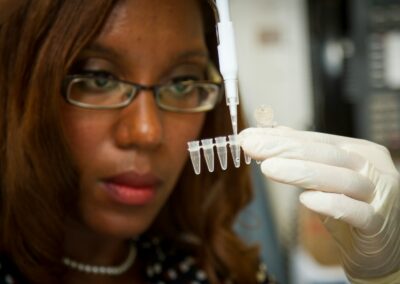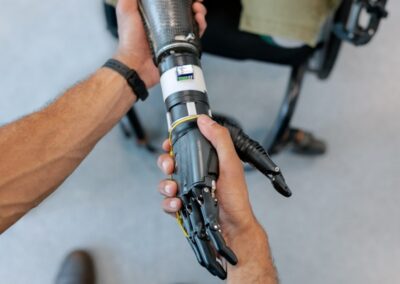Shaping Society’s Approach to Reproductive Technologies in Saudi Arabia and UAE
The Ethical Landscape of Genetic Engineering
In the realm of modern technology, genetic engineering stands as one of the most transformative advancements, particularly in the field of reproductive health. In regions like Saudi Arabia and the UAE, where innovation is highly valued, the ethical considerations surrounding genetic engineering for fertility enhancement are of paramount importance. Genetic engineering involves the direct manipulation of an organism’s genes using biotechnology, offering unprecedented possibilities for enhancing reproductive capabilities. This includes correcting genetic defects, selecting desirable traits, and potentially increasing fertility rates. However, these advancements raise significant moral questions. The potential to alter human genetics touches on fundamental ethical issues such as the sanctity of human life, the natural order, and the implications of playing a god-like role in human development. As Saudi Arabia and the UAE navigate these complex moral landscapes, it is crucial to establish robust ethical frameworks that guide the responsible use of genetic technologies in reproductive health.
Balancing Innovation with Ethical Responsibility
The integration of genetic engineering in reproductive technologies requires a careful balance between scientific innovation and ethical responsibility. In Saudi Arabia and the UAE, this balance is achieved through rigorous regulatory frameworks and ethical guidelines that oversee genetic research and its applications. These regulations ensure that genetic interventions are conducted with the highest standards of safety, efficacy, and ethical integrity. Ethical committees and regulatory bodies play a vital role in reviewing and approving genetic engineering projects, ensuring that they align with societal values and moral principles. For instance, the Saudi Food and Drug Authority (SFDA) and the UAE Ministry of Health and Prevention (MOHAP) have established comprehensive guidelines for genetic research, emphasizing the need for informed consent, transparency, and the protection of human rights. By fostering a culture of ethical responsibility, Saudi Arabia and the UAE can harness the potential of genetic engineering while safeguarding against its misuse.
Societal Impacts and Moral Considerations
The societal impacts of genetic engineering for fertility enhancement are profound and multifaceted. In Saudi Arabia and the UAE, where family and heritage hold significant cultural importance, the ability to enhance reproductive capabilities through genetic modification can have far-reaching implications. On one hand, genetic engineering offers the promise of overcoming infertility, preventing hereditary diseases, and improving overall reproductive health. On the other hand, it raises concerns about genetic inequality, eugenics, and the commodification of human life. The moral considerations surrounding these issues are deeply rooted in cultural, religious, and philosophical beliefs. For example, in Islamic bioethics, the sanctity of life and the principles of justice and compassion are central to ethical decision-making. As such, any intervention that involves altering human genetics must be carefully weighed against these moral values. By engaging in open and inclusive dialogues, Saudi Arabia and the UAE can navigate these moral complexities and develop ethical frameworks that reflect the diverse perspectives of their societies.
The Role of Artificial Intelligence in Genetic Engineering
Artificial Intelligence (AI) plays a pivotal role in advancing genetic engineering technologies, particularly in the field of reproductive health. In Saudi Arabia and the UAE, AI-driven tools and algorithms are being utilized to analyze vast amounts of genetic data, identify potential genetic modifications, and optimize fertility treatments. AI enhances the precision and accuracy of genetic interventions, reducing the risks associated with traditional genetic engineering methods. However, the integration of AI in genetic engineering also raises ethical concerns, particularly related to data privacy, algorithmic bias, and the potential for misuse. Ensuring that AI applications in genetic engineering adhere to ethical standards is crucial for maintaining public trust and safeguarding against potential harms. In Riyadh and Dubai, regulatory bodies are increasingly focusing on the ethical implications of AI, emphasizing the need for transparency, accountability, and ethical governance in AI-driven genetic research.
Leadership and Ethical Governance in Genetic Engineering
Effective leadership and ethical governance are essential for guiding the responsible use of genetic engineering in reproductive health. In regions like Saudi Arabia and the UAE, leaders in the biotech and healthcare sectors play a critical role in shaping ethical policies, fostering innovation, and promoting public awareness. Ethical leadership involves making informed decisions that prioritize the well-being of individuals and society, while also considering the long-term implications of genetic technologies. Leaders must ensure that genetic engineering projects are conducted with integrity, transparency, and accountability, fostering a culture of ethical responsibility within their organizations. In Riyadh and Dubai, initiatives such as public consultations, ethical training programs, and interdisciplinary collaborations are being implemented to enhance ethical governance in genetic engineering. By prioritizing ethical leadership, Saudi Arabia and the UAE can lead the way in developing responsible and sustainable genetic technologies.
Project Management for Ethical Genetic Engineering
Project management is a crucial aspect of implementing genetic engineering initiatives in a manner that aligns with ethical guidelines and societal values. In Saudi Arabia and the UAE, project managers must ensure that genetic engineering projects are meticulously planned, executed, and monitored, with a strong emphasis on ethical considerations. This involves conducting comprehensive risk assessments, obtaining necessary regulatory approvals, and ensuring compliance with ethical standards throughout the project lifecycle. Project managers must also facilitate effective communication and collaboration among various stakeholders, including scientists, ethicists, regulatory bodies, and the public. By adopting best practices in project management, organizations can enhance the ethical oversight of genetic engineering projects, mitigate potential risks, and achieve successful outcomes that benefit society. In cities such as Riyadh and Dubai, the emphasis on ethical project management is driving the development of innovative and responsible genetic technologies, setting a benchmark for the global biotech industry.
Conclusion: Navigating the Ethical Landscape of Genetic Engineering
The ethical considerations surrounding genetic engineering for fertility enhancement are complex and multifaceted, requiring careful deliberation and responsible governance. In regions like Saudi Arabia and the UAE, where innovation in reproductive health is a priority, addressing these moral considerations is crucial for ensuring the responsible use of genetic technologies. By balancing scientific innovation with ethical responsibility, fostering effective leadership, and implementing robust project management practices, Saudi Arabia and the UAE can navigate the ethical landscape of genetic engineering and set a global standard for responsible innovation. As the world continues to advance in the field of genetic engineering, these regions can lead the way in developing ethical and sustainable solutions that enhance reproductive health and benefit society as a whole.
—
#GeneticEngineering, #ReproductiveTechnology, #FertilityEnhancement, #EthicalConsiderations, #AIinGenetics, #LeadershipInTech, #ProjectManagement, #SaudiArabia, #UAE, #Riyadh, #Dubai























